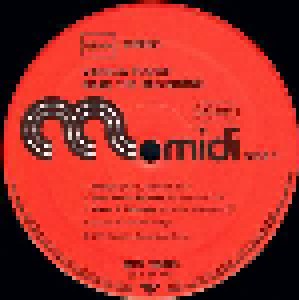

Pepper's Lonely Hearts Club Band or Absolutely Free that have grown with each passing year, Vanilla Fudge feels more like a relic from the psychedelic era than a truly timeless classic. Unlike some other 1967 landmarks like Sgt. Especially over forty five years after its release, Vanilla Fudge doesn't sound terribly exciting or artistically ambitious. It's certainly interesting to hear all of these songs re-imagined in a psychedelic setting, but that's arguably all that it remains - a re-imagining. Their take on The Beatles' "Eleanor Rigby" is a fine example of this, as is their interpretation of the Motown classic "You Keep Me Hangin' On". Though the songs may be the same, Vanilla Fudge's renditions of these tracks sound entirely their own. This is a bit of a turn-off for me (I typically like bands to write their own material), but it's clear that these guys put a lot of thought into the arrangements. Though I would not call Vanilla Fudge a terribly groundbreaking observation, it's easy to understand why this record was so influential as it solidified everything that early psychedelic rock was about.Īs mentioned previously, all of the tracks on Vanilla Fudge are cover tunes. Although sidelong jams and increased experimentation hadn't yet become the norm, heavy use of the Hammond organ and Beatles-influenced vocal melodies are plentiful here Vanilla Fudge were also at the forefront of early hard rock, and some of the organ sections here clearly paved the way for heavy acts like Deep Purple and Uriah Heep. Musically, we're dealing with psychedelic rock that isn't too far away from what most bands in the genre were doing in 19. While this formula certainly allowed lots of creativity and solid musicianship to shine through, I don't think that Vanilla Fudge stands as a particularly bold artistic statement or ageless classic. Consisting solely of cover tunes and a few short interludes thrown in for good measure, Vanilla Fudge did not captivate listeners with original works of their own, but instead showed what they could do within the limits of famous pop songs from years past. The heavy, jam-oriented atmosphere combined with Mark Stein's prominent organs were rather unique given the time period, and the group's original twist on well-known compositions grabbed the attention of fans and critics alike. Released during the famous 'summer of love' in 1967, Vanilla Fudge's debut offering was undoubtedly one of the more seminal psychedelic albums coming from America during the late sixties'. This is only recommended to the most die-hard of psychedelic collectors - all others should proceed with extreme caution. A directionless and confusing album, The Beat Goes On is a failed experiment in my book, and a disappointing followup to Vanilla Fudge's 1967 debut. The Beat Goes On aims to transport the listener through history, musical and otherwise, and although this is a great concept, the execution is baffling. It's actually a shame that the band never decided to flesh out any of the tunes here, as I think a heavy psychedelic version of "Fur Elise" or "Hound Dog" could have made for an entertaining listen. Instead, they briefly touch on numerous compositions, and the result is an incoherent mess. The Beat Goes On does have some cool musical ideas from time to time, but they rarely expand beyond interesting fragments although Vanilla Fudge sticks to cover tracks once again, they never actually recreate any of the tracks they pay homage to. As cool as a sound collage of twentieth century political figures can be if done right, it seems out of place and overly long when it takes up eight minutes on a rock album. There are flirtations with conventional music, like the piano intro "Sketch" and a few Beatles covers in rapid succession, but a majority of the music seems to have very little direction at all - a good portion of side two can hardly be called music, if truth be told. The Beat Goes On has a few interesting things going on, but the band's total disregard for musical structure and composition makes for a tough pill to swallow, even when looked at from a historical perspective.Īlthough the music on 1967's Vanilla Fudge was primarily straightforward organ-led psychedelic rock, the same can not be said for The Beat Goes On.

The success of that album only increases the confusion generated by The Beat Goes On, the American outfit's controversial sophomore observation - this experimental album is a 'head scratcher' for sure, and though some have hailed it as a misunderstood masterpiece, I will join the choir of folks that just don't get it. Vanilla Fudge's debut may not have moved me a whole lot as a listener, but I certainly understand the album's place as a seminal album in the development of psychedelic and heavy rock music.


 0 kommentar(er)
0 kommentar(er)
